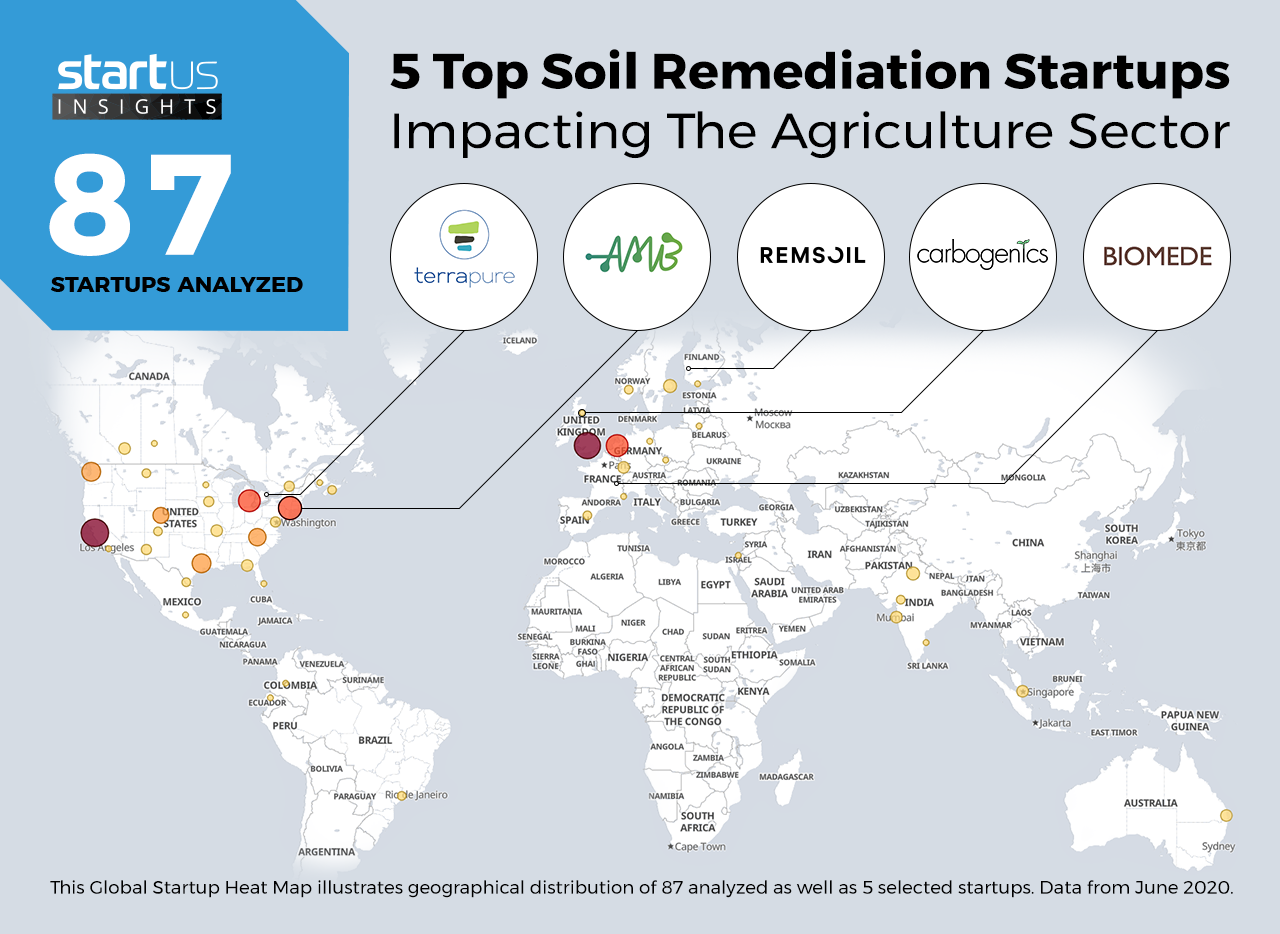Our Innovation Analysts recently looked into emerging technologies and up-and-coming startups working on solutions for the agriculture sector. As there are a lot of such startups working on various different applications, we decided to share our insights with you. Here, we take a look at 5 promising soil remediation startups.
Heat Map: 5 Top Soil Remediation Startups
Using our StartUs Insights Platform, covering 1.116.000+ startups & emerging companies, we looked at innovation in the field of agriculture. For this research, we identified 87 relevant solutions and picked 5 to showcase below. These companies were chosen based on a data-driven startup scouting approach, taking into account factors such as location, founding year, and technology among others. Depending on your specific criteria, the top picks might look entirely different.
The Global Startup Heat Map below highlights 5 startups & emerging companies developing innovative soil remediation solutions. Moreover, the Heat Map reveals regions that observe a high startup activity and illustrates the geographic distribution of all 87 companies we analyzed for this specific topic.
Terrapure Environmental – Biosolids-Based Soil Amendments
Soil remediation often involves the use of amendments that remediate and revitalize infertile soils. Residuals from treated domestic sewage, or biosolids, are a good source of nutrients and serve well as amendments. Biosolids-based soil amendments replenish the organic matter of the soil and also reduce farmers’ dependence on fertilizers.
Terrapure Environmental is a Canadian startup that offers environmental solutions for land reclamation. It provides biosolids-based soil amendments that replenish soil nutrients and organic material, increases soil porosity, and also help tackle erosion. Moreover, the customized solutions suit the particular nutrient needs of each farm and help improve yields. Other than agriculture, the startup’s solutions find applications in mine and industrial site rehabilitation.
Allied Microbiota – Microbial Remediation
Microbial remediation uses microbes to degrade organic contaminants or bind heavy metals to reduce their bioavailability. It is broadly classified into biostimulation or bio-augmentation. Biostimulation revitalizes existing microbial communities in the soil. Bio-augmentation, on the contrary, introduces particular strains, natural and genetically engineered, to the soil.
The US-based startup Allied Microbiota develops microbial products and enzymes to break down harmful organic chemicals. PacBac consists of naturally occurring, non-pathogenic, thermophilic bacteria that are used as bio-augmentation cultures. It enhances the bioremediation of chlorinated solvents such as dioxins, furans, polychlorinated biphenyl (PCB), and polycyclic aromatic hydrocarbons (PAH).
Carbogenics – Biochar
Burning organic waste in a controlled process called pyrolysis yields biochar, a soil amendment. Depending on the composition of the feedstock, biochar has varying physical and chemical properties. Its extremely porous nature improves the retention of water-soluble nutrients. It also enhances the microbial activity of the soil and accelerates remediation.
Carbogenics is a British startup that develops a biochar solution for bioremediation. It uses low carbon technology to convert difficult-to-recycle waste into functional carbon composites. CreChar is environmentally friendly and finds applications in soil amendment and remediation. Use cases include bio-augmented degradation of petroleum hydrocarbons in soils and soil resaturation, as well as immobilization of heavy metals.
Biomede – Phytoremediation
Phytoremediation involves the use of plants to remove pollutants, usually heavy metals, from soil or other environmental samples. It makes use of certain plants’ natural ability to extract toxic elements from the soil. The contaminants are then recovered and re-used by harvesting the plants. Since it uses natural plants for remediation, phytoremediation is cheaper than other soil remediation methods.
French startup Biomede provides phytoremediation solutions for soils polluted with heavy metals. The startup offers a free diagnosis of the pollution level of farmlands and then supplies seed mixtures adapted to the soil there. The plants extract copper from the land, which is then available for revalorization.
Remsoil – In-Situ Soil Remediation
Contaminated soil is usually removed from the site for treatment elsewhere or disposal in a landfill. However, the handling of contaminated soil comes with health and environmental risks. In-situ soil remediation uses organisms or their products to remediate the soil without removing it.
Remsoil is a Finnish startup that offers in-situ soil remediation solutions. REMSOIL is a soil remediation additive composed of agricultural byproducts. It stimulates the microbial activity of soil and accelerates the natural breakdown of harmful substances such as oils and PAH. The solution tackles two challenges at once – agricultural waste and contaminated soil.
What About The Other 82 Solutions?
While we believe data is key to creating insights it can be easy to be overwhelmed by it. Our ambition is to create a comprehensive overview and provide actionable innovation intelligence so you can achieve your goals faster. The 5 soil remediation startups showcased above are promising examples out of 87 we analyzed for this article. To identify the most relevant solutions based on your specific criteria, get in touch.









